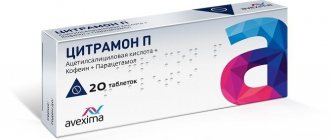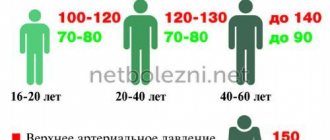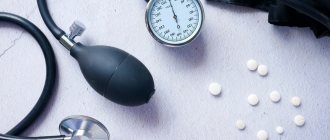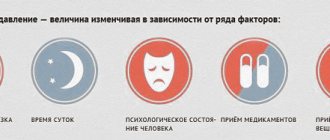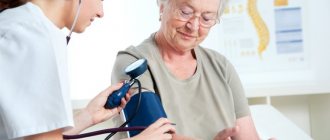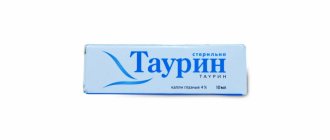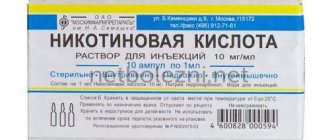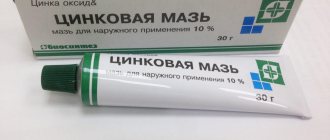Arterial hypertension affects more than 50% of the world's population. The risk of changes in the functioning of blood vessels and the heart increases with age. If in children and young people the indicators are almost always normal or slightly below average, then in men and women after 50 years of age, people with stable 120/80 are rarely found. In most cases, blood pressure levels tend to rise. This is facilitated by a decrease in the elasticity of the vascular walls, accumulated chronic disorders, changes in hormonal status and other factors.
Why is it necessary to reduce blood pressure?
Lowering blood pressure is a necessary part of the treatment of hypertension, which has various origins. This must be done not only to improve well-being, but also to eliminate dangerous conditions:
- crisis;
- arrhythmias;
- hypoxia;
- disturbances in the blood supply to the tissues of internal organs and the brain.
If you ignore high blood pressure readings, the risk of strokes, heart attacks, progression of angina and heart attacks increases. Everyone whose indicators are outside the normal range has to resort to drugs that normalize blood pressure:
- 120–140 mm/Hg: systolic (upper);
- 80–89 mm: diastolic (lower).
Blood pressure close to the lower limits is considered ideal. A tendency to periodically increase values may be the first sign of pathology. Factors provoking the development of the disease:
- stress;
- chronic systemic diseases;
- unfavorable heredity;
- congenital heart and vascular defects;
- disorders of the kidneys;
- unhealthy diet;
- smoking;
- obesity;
- disturbance of carbohydrate or lipid metabolism.
People with incipient or established hypertension often think that they have no health problems. High blood pressure may not show itself at first. As the pathology progresses, it causes sharp throbbing headaches. During an increase in pressure, vision impairment, tinnitus, nausea, and general weakness may occur. Without drug correction, it is not far from a serious attack and irreversible consequences.
Does Ketorol increase blood pressure?
Ketorol relieves inflammation and pain. Refers to non-steroidal drugs. The active ingredient of this medicine is ketorolac. Ketorol is available in tablets and liquid for injection. When taking the medicine, a slight increase in blood pressure may occur. But this only happens if a person is prone to hypertension. Ketorol cannot be combined with drugs that lower blood pressure, as well as with diuretics, because taking Ketorol will reduce their effectiveness.
How to use high blood pressure medications
People suffering from hypertension should not buy medications that normalize blood pressure on the advice of friends, pharmacists, or by their own choice. Medicines in this category are selected strictly individually. This is done by the attending physician based on the results of the examination. The type of tablets, their dosage, frequency of administration, and course duration are also determined separately for each patient. The age, stage of hypertension, the causes that caused it, and concomitant diseases are taken into account.
In most cases, patients require medication correction constantly. The doctor may prescribe one or more drugs with different principles of action. Over time, it may be necessary to increase the dosage of tablets. And as your physical condition improves, the amount of medication is reduced.
There are 6 groups of medications to normalize high blood pressure. They all have different mechanisms of action and are available by prescription.
Classification of antihypertensive drugs
Medicines for hypertension, depending on the mechanism of their effect on the human body, are divided into the following groups:
- Agents acting on the renin-angiotensin system.
- Calcium channel blockers.
- Alpha adrenergic blockers.
- Beta blockers.
- Diuretics.
- Neurotropic drugs of central action.
- Medicines that affect the central nervous system.
Doctors often prescribe several blood pressure-lowering drugs to a patient at once, and there is a rational grain in this - combination therapy for many patients will have a more effective effect than taking one drug.
Below we will describe the principle of operation of drugs representing each of the above pharmacological groups.
Calcium antagonists
By blocking the penetration of calcium ions into cells, these drugs cause a reflex relaxation of the muscle walls of blood vessels, reducing their tone. As a result of the expansion of the lumen of the arteries, the blood pressure decreases. Side effects of such drugs include: tachycardia, heart rhythm disturbances, dizziness. Popular tablets of this group:
- Dialtiazem;
- Verapamil;
- Norvasc.
The drugs effectively reduce blood pressure in various forms of hypertension, but do not combine well with other groups of antihypertensive drugs and have many contraindications.
Clinical indications for taking rapid-acting drugs
“First aid” tablets or medicines with instant action should be used in extreme cases, for example, with a rapid increase in blood pressure or an attack of hypertension, when previously used therapeutic actions have proven ineffective.
This rule is due to the fact that such medications contain an increased concentration of active substances, so there is a high probability of an unpredictable reaction of the body due to side effects.
In addition, these drugs are not first-line medications in the treatment of hypertension, as they have a rapid but short-lived effect.
- ACE inhibitors - list of drugs. Mechanism of action of new generation ACE inhibitors and contraindications
So in what cases can you take pills to quickly lower blood pressure? Experts name a number of conditions when taking these drugs is advisable:
- The frequency between sudden surges in blood pressure is less than 30-60 minutes.
- The blood pressure level in patients over 60 years of age exceeds 150/90 units.
- There is severe dizziness.
- There is an increase in heart rate.
- Manifestation of cramps in the calf muscles.
- Nausea and vomiting are present.
- Blurred consciousness and black spots before the eyes.
- Recently suffered from a hypertensive crisis.
- The doctor prescribed taking this medicine in case of a significant increase in blood pressure.
When eliminating an acute pathological situation with fast-acting medications at home, doctors advise:
- The pressure should not be reduced quickly, but gradually, in several stages, that is, at first by no more than 25%.
- Then, over the course of 2-6 hours, reduce to 160/100, measuring blood pressure every 30 minutes, monitoring the upper and lower arterial levels.
- If the pressure rises again to 180/110, take a second dose of the medicine (the interval between the previous dosage should not be less than 30 minutes).
- Maintain the minimum effective dosage, which will help avoid overdose and a sharp drop in blood pressure and pulse rate, as well as the manifestation of hypotension, which is dangerous for the development of ischemia and other serious consequences.
ACE inhibitors (angiotensin-converting enzyme)
Drugs that reduce the production of the enzyme that produces angiotensin, a hormone that provokes vascular spasms and a subsequent increase in blood pressure. They act quite gently, improve the outflow of excess fluid from the body, eliminating swelling. But they often provoke coughing attacks - this is their characteristic side effect. Common drugs:
- Zokardis;
- Captopril;
- Criminals
All products are available in the form of tablets of various dosages.
Does creatine increase blood pressure?
Creatine is an amino acid that athletes take as a supplement. Creatine increases endurance and is used for more active muscle building. The feeling of fatigue when taking creatine becomes less, so workouts can be more intense, etc.
Creatine retains some fluid in the body, which is why it presumably increases blood pressure. But this only occurs in a small percentage of people. For others, urine output and blood pressure remain unchanged. To prevent blood pressure from increasing with constant use of creatine, it is better not to drink strong tea (including pu-erh) and coffee during this period.
Features of the treatment of hypertension
Therapy for hypertension is not carried out periodically, but with the constant use of an antihypertensive drug.
It is an extremely dangerous misconception to use the drug only “when there is pressure.” If hypertension is diagnosed, there is a tendency for a persistent increase in systolic pressure above 140 mm. rt. Art., an antihypertensive drug is taken daily, preferably at the same time, under constant monitoring of blood pressure, for life.
Antibiotics and blood pressure
Antibiotics today treat most infectious diseases. Antibacterial drugs do not affect the activity of the heart and the condition of blood vessels if taken as prescribed by the doctor. If you drink alcohol during a course of antibiotics, the toxic effect of the drugs on the body is likely to increase. Death as a result of such negligence with one’s own body is also possible. The combination of alcohol and drugs can greatly increase blood pressure, make it difficult to breathe, and slow down your heart function. The load on the liver also increases, which affects blood pressure levels.
Actovegin for blood pressure
Actovegin improves tissue nutrition and affects reparative processes. It is prescribed for encephalopathy, ischemic stroke, neurological diseases, etc. Actovegin does not increase blood pressure, and in some cases it can reduce it. The drug can be prescribed for cerebral vascular hypertension, because its active ingredients moderately dilate blood vessels. In severe hypertension, Actovegin is part of systemic therapy and is administered intravenously.
Preventive measures
If you have occasional problems with blood pressure, you should not always start with taking medications. In 80% of cases, hypotension occurs due to uncontrolled use of drugs for hypertension, lack of sleep, overwork, neuroses, and lack of vitamins C, E, B12. Therefore, for prevention, it is worth establishing a daily routine, increasing physical activity, and including healthy foods and drinks in the menu.
General recommendations:
- sleep at least 9 hours at night;
- regularly ventilate the premises;
- do exercises, train with a manual expander, swim, walk at least 2 hours a day - physical exercise tones blood vessels;
- drink 1.5-2 liters of water per day (and more in hot weather);
- do not stand in one place for a long time, when standing, do warm-ups (walk, jump, squat);
- take a contrast shower;
- avoid prolonged stay in a hot bath or stuffy room;
- regularly eat vegetables and fruits, fat-containing foods;
- do not abuse alcohol.
How to eat with low blood pressure
If possible, split meals should be arranged. It is advisable to divide the daily amount of food into 6-8 times, eat in small portions. The combination of products is selected so that every breakfast, lunch, dinner and snack is balanced. For hypotension, the menu includes the following products, dishes and spices:
- Fatty fish, beef liver, brains, red meat. It is better to boil, bake, steam them in order to preserve the maximum of useful components. The liver is used to make pates or add to salads.
- Fried meat, vegetables. They increase cholesterol levels and blood pressure. You need to eat fatty foods in moderation so as not to harm your digestive system. If you have problems with the gastrointestinal tract, such dishes are undesirable.
- Carbohydrates. There are many of them in confectionery and sweet baked goods. Such food promotes vasoconstriction and increases blood pressure, but in large quantities it is harmful and is contraindicated for diabetics.
- Porridge (buckwheat, oatmeal), beans, peas, beans.
- Vegetables, fruits, berries containing a lot of flavonoids and iron. These are carrots, beets, pomegranates, raspberries, currants, dogwoods, strawberries, citrus fruits, and greens. Every day they should be eaten up to 800 g in 5-6 meals in the form of side dishes, additives to sandwiches, smoothies, compotes, fruit salads.
- Salt, onion, garlic, horseradish, cloves, cinnamon. Salt retains fluid, and spices constrict blood vessels.
Smoked meats, marinades, salted fish, and cheeses will help increase blood pressure.
Herbal infusions and decoctions
If you are prone to hypotension, take infusions of herbs and berries. 1.5 tbsp. spoons of vegetable raw materials are poured into 300 ml of boiling water, cover with a lid, leave for 4 hours and filter. Drink the prepared drink three times a day, half a glass before meals. Here are some effective formulations:
- 20 g of black currant berries and barberry fruits, 40 g of rose hips, 30 g of lungwort herb
- 30 g each of black currant leaf, chicory root, plantain leaf, nettle herb, 20 g dandelion root
- 40 g red rowan, 30 g each wheatgrass and strawberry leaves, 10 g centaury herb
In folk medicine for hypotension, a decoction of a mixture of birch leaves, nettles, strawberries, black currants, and rose hips is used. 4 tbsp. spoons of the collection are poured with a liter of hot water, brought to a boil and boiled for 2 minutes. Let it brew for an hour, filter, drink 100 ml before meals.
When using folk remedies, do not forget to check your blood pressure with a tonometer.
Important information
The new generation of anti-hypertension pills can combat high blood pressure much more effectively than outdated medications. Previously, the problem required the prescription of a whole complex of drugs, each of which performed a specific task. New generation products allow the patient not to take a lot of pills. Pressure-lowering substances have become more powerful, and their therapeutic effect has become more pronounced.
Today, it is enough to take one drug that will provide a lasting reduction in blood pressure at home, since one tablet includes a whole range of active ingredients.
The latest generation of medications for hypertension are created in such a way that they are able to act on the patient’s body in many ways, reducing blood pressure quickly and safely. In addition, the latest tools for normalizing this indicator have a number of additional improved properties.
Hypertension causes headaches. This symptom is very unpleasant and does not always go away with medication. Often, medications for high blood pressure cope with their task, lowering this indicator, but the pain syndrome remains. Few people know why promotion can cause headaches. There are many reasons for such symptoms. Doctors identify several factors that provoke discomfort:
- Vascular. Hypertension causes a disturbance in the tone of veins and blood vessels in the brain. In a healthy person, their narrowing and expansion is controlled by a compensatory mechanism at the reflex level. In a hypertensive patient, the arterial walls contract and remain in this state for a long time, so a headache appears, most often felt in the back of the head, which can be accompanied by vomiting and nausea. Medicines that reduce blood pressure do not always cope with the elimination of pain; it is necessary to take additional medications.
- Liquor. In this case, the pain appears from increased pressure over a long period of time. This situation provokes a severe headache, since the cerebral fluid begins to put pressure on the walls of the ventricles of the brain. When symptoms occur, the patient feels pain in the back of the head. If the pressure level remains elevated for a long time, then pain can spread over the entire surface of the head and be accompanied by nausea, weakness, and vomiting. New generations of antihypertensive drugs are not always able to cope with this problem. The danger of this condition is that if you do not start treating a person on time, cerebral edema may develop, the signs of which are severe dizziness and total loss of consciousness.
- Ischemic. Spasm of cerebral vessels, which occurs when blood pressure rises, can provoke the development of oxygen starvation, which is manifested by headaches and other unpleasant symptoms. Vomiting, darkening of the eyes, impaired consciousness and other signs are added. Modern drugs for the treatment of hypertension can cope with this situation and relieve its consequences.
- Neuralgic. High arterial parameters increase the pressure inside the skull, which can greatly irritate the nerve endings, causing pain that shoots and radiates to other parts of the body (usually in the temples or eyes).
If the disease is not treated, then over time the pain in the head will become painful and constant. Hypertensive patients always need medications that lower blood pressure; they must be taken daily, otherwise complications (heart attack, stroke, TIA) cannot be avoided.
